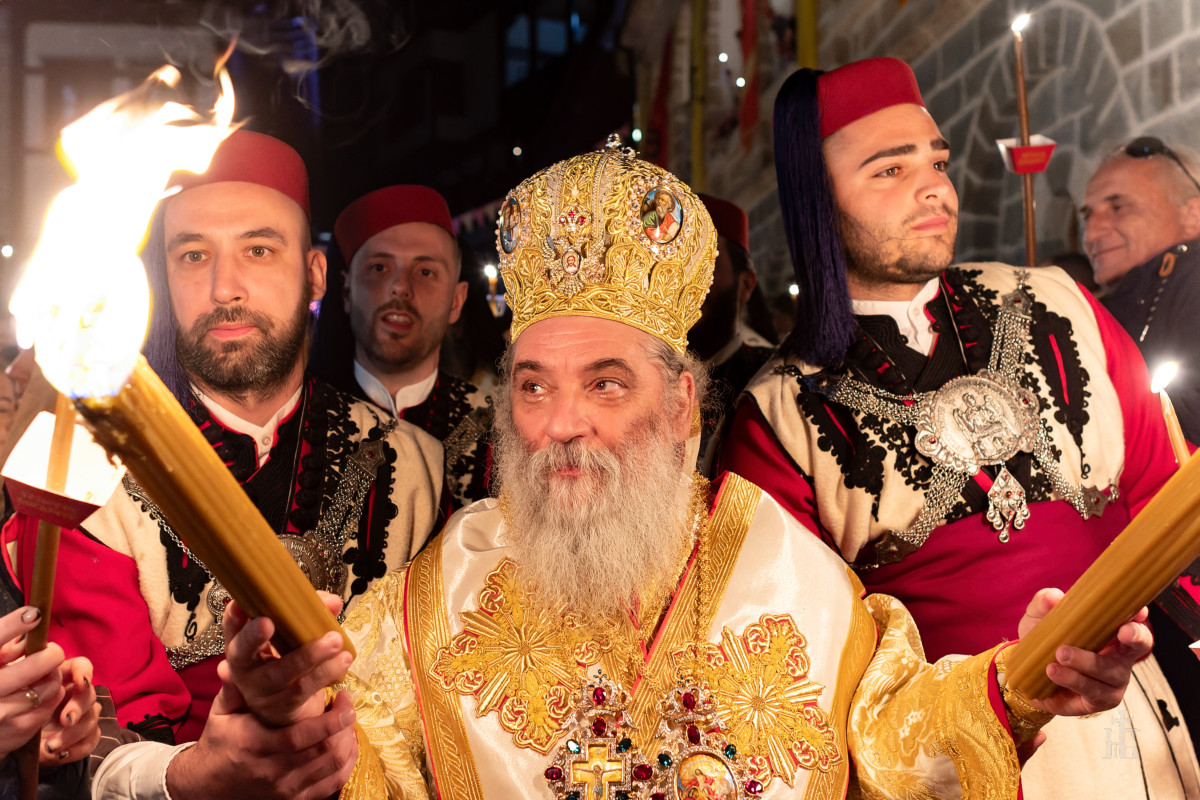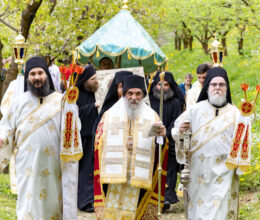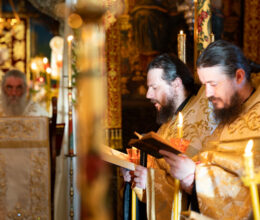Homily of His Grace, Bishop Partenij of Antania, on Holy Pascha 2025
CHRIST IS RISEN!
Powerful and essential words! Words of immense transforming power! For only in Christianity, only in the light of the Gospel, the term Resurrection is not merely a word—it is a proven and lived reality.
When we greet one another with the victorious acclamation Christ is Risen, we do not say it as custom or empty phrase, but as the very foundation, the very heart of everything: of our faith, of our life, of eternal light.
For only in Christ, only through His Resurrection, is death—that final boundary, that deepest sorrow and abyss of humanity—overcome, transfigured, and ultimately vanquished.
Death, which we experience as a profound estrangement, as something unnatural to man, something foreign to what we were created for. And so, humanity rises in revolt against it. Mankind hates death. And behold—it is finally defeated through Christ’s rising from the realm of the dead.
Yes, Christ is risen—and precisely because of that, every fear, every despair, every shadow, every sorrow, is given a new dimension: changed, transformed.
We read in the Gospel that even Christ Himself, in His humanity, approaches death with deep sorrow, with tears; the incarnate God weeps at the tomb of His friend Lazarus. And suddenly He cries out: “Lazarus, come forth!” And the man dead four days walks out of the tomb alive.
This is not merely a miracle. It is a foretaste. A forerunner. A mystical sign of what shall befall the whole world at the Second Coming, at the dawning of the unending Eighth Day of the Resurrection.
“I am the Resurrection and the Life,” says the Lord. And truly, He did not only raise Lazarus, but also the widow’s son at Nain, the daughter of Jairus, and all who had fallen asleep in the sleep of death—from Adam to the last soul—have been called into light, into life. Christ is risen—and with Him, the new creation has begun. “Behold, I make all things new” (Rev. 21:5). For He did not accept death as an end, but destroyed it by His death. He entered into the very dominion of death—into that place where, from time immemorial, the dead had slept—and there He awakened them all. He illumined Hades with the power of His Divinity.
There, in the depths, where Adam and Eve, the prophets and the righteous, had waited for centuries, there His soul descended—not as the soul of one dead, but as the Soul of the Life-Giver. And He called them all unto Himself.
Then He rose—not only in soul, but also in body—to reveal the new and transfigured body, the deified body, the eternal Man. And that body now sits at the right hand of God the Father—not as a mere idea, but as reality.
And it is precisely because of this that everything we do in the Church—every Holy Mystery: baptism, fasting, communion, love—is participation in that very Resurrection. Everyone who is baptized in the name of the Father and of the Son and of the Holy Spirit already bears the pledge of resurrection. Not merely as hope, but as a reality that is coming. Every Christian is called to deification, to fullness, to a life that knows no end. This is the essence of everything. This is the truth about man.
And that is precisely why we rejoice today—not because of an idea, nor because of a memory, but because of the true, essential presence of the Risen Lord in our midst. This is a joy not rooted in emotion, but in truth.
We have certainty—not from human words, but from the very testimony of God Himself, confirmed by the holy Apostles, by the entire Church, and by the Holy Spirit Himself. Yes, they sealed the Tomb. They set a guard. They sought, by human means, to restrain the One Who came to destroy death. But their human precautions turned against them and became proof—of what? That Christ did not rise from some obscure or forgotten grave, but from a tomb sealed and watched over, with witnesses. And the voice of those witnesses still echoes through the ages: “We have seen the Lord!”
And not only did He rise, but He appeared to His own—to the Myrrh-bearing women and to His disciples. He shattered sorrow, overcame fear, and filled the hearts of His followers with peace, with love, and with a new reality—the Kingdom of God. That Kingdom is not established through force, but through the Cross, through love, through self-sacrificing patience and holy silence. And we, today, in this Divine Eucharist, are not merely listeners, but participants. By receiving His Body and Blood, we live the Resurrection—we taste of the Life that does not end. Saint John Chrysostom reminds us: Believe! At every Divine Liturgy, it is from the very hands of Christ Himself that you receive His Body and Blood—as a pledge of eternal life. He gives Himself to us, that we may already—here and now, even in this mortal body—become citizens of Heaven.
But for this, beloved ones, vigilance is required. Gratitude. Responsibility. Let us not become— as we often do—those who undermine our beautiful Faith by the witness of our own lives. Let us not be among those who, through negligence, prevent the world from seeing Christ. For our life is a testimony—and if that life is dark, then the darkness envelops not only us, but those around us as well. The world judges the Lord according to the lives of us Christians. And Christ—He longs to be with us. He longs to open our hearts and to fill them with His Light. And that, truly, is the heart of the Resurrection: That God does not stand afar off. He does not abandon us. He descends. He becomes one of us. He is born as a child. He becomes man. He enters the very depths of human estrangement—into Hades—and from there He calls out to us: “Rise up! Be resurrected! Live in Him!”
Everything is prepared. He has opened the door. Now all that remains is our “yes.” Our response to His love. And if we utter that “yes” from the depths of our heart, then the miracle will take place. We shall become children of the Resurrection. We shall become people of the Light. We shall become witnesses of the Life that never fades.
Beloved, we see clearly that today we are living in a time of an invisible yet deeply present tyranny. It no longer takes physical force to enslave man—technocracy is enough. Images, sounds, screens—these are enough to separate us from ourselves and from others. Today, man lives not so much in reality, but in a virtual projection of himself—less and less truly, less and less personally, more and more “online.” We do not condemn—but we observe: even now, at this unique and holy Paschal Vigil, we see people with phones in hand; instead of participating in the sacred atmosphere and entering into prayer, their eyes are fixed on their screens. It seems we have forgotten what it means to be here and now—with others, with ourselves, with God. We have forgotten how to look each other in the face, how to rejoice in one another, how to live the communion which is the very essence of the Church. For the Church is not an ideology. The Church is communion. The Church is an Eucharistic encounter—with God and with our brothers and sisters. And yet, paradoxically, in this so-called “age of communication,” we have ceased to truly commune.

But Christ, beloved, does not condemn us. He calls us. The call of Holy Pascha is exactly this: a return to truth, a return to reality, a return to light, to life. We Christians are called to be witnesses of that Light, to be apostles in our own time—not with empty words, but with our lives. With a quiet yet steadfast love. With sincerity toward our neighbor. With a simple life that testifies: God is here. Christ is Risen. We are the ones who have received Holy Baptism—and this means that we are a new creation, a new humanity. Christ did not come merely to comfort us—He came to transform all of life. To restore the world to its true purpose and destiny. And we—yes, we—are the ones through whom the life-giving Light of the Resurrection is meant to shine forth into every place.
Let us not forget: the world is perishing because of our irresponsibility. Nature is suffering, because man has forgotten that he was placed by God not to be a greedy tyrant, but a good steward. To protect, not to exploit. To love, not to destroy.
But today—the Day of the Resurrection—is a day of a new beginning. As the Psalmist proclaims: “This is the day which the Lord has made; let us rejoice and be glad in it!” That is why we hold these candles in our hands—testifying that Christ is the Light, and that Light illumines us all. It gives us life and grace. May the Resurrection of Christ become a reality in our lives—not only once a year, but every day.
On this Feast, there is no need for many words. The day itself speaks. Pascha itself, Christ’s Passover, proclaims the most powerful message—if only we have hearts to hear it. And that message, beloved, is not quiet. It breaks bones, awakens hearts, shatters stones. For the Resurrection is not a theory. It is not an ideology. It is an event. It is Light entering darkness, Life entering death. Christ is Risen—and nothing remains the same. Open your hearts. Be free from all that is dead within you, from all illusion, from every sinful habit. Become a new creation! Do not be sleeping Christians who bear the name but not the life of Christ! Yes, the world, ourselves, and our neighbors—we are all weary of Christians without Christ, of life without light, of faith without transformation. But Christ came to bring exactly this: transformation, new life, a new beginning.
To be a Christian means to be a light in darkness, a warmth in the cold of the world, a bearer of hope where others see only despair.

Truly, we could speak until the morning—because I see before me a great multitude, with such a deep longing to hear of the Lord; you are of one heart and soul, gathered around Love, gathered around Christ, for we feel that He is here—alive, risen, in our midst. But let the grace of this night speak. Let the power of the Eucharist speak. Christ gives Himself to us. That is everything.
May God bless you all, beloved. May He bless our Homeland. May He comfort this world, so torn by unrest and war. May Christ, the God of peace, grant His peace to your hearts, to your homes, and to all nations. And I especially pray that each of you may experience a true, living, grace-filled union with the Risen Christ. Every Divine Liturgy is Pascha. Every Holy Communion is Resurrection.
CHRIST IS RISEN!
CHRIST IS RISEN!
CHRIST IS RISEN!















